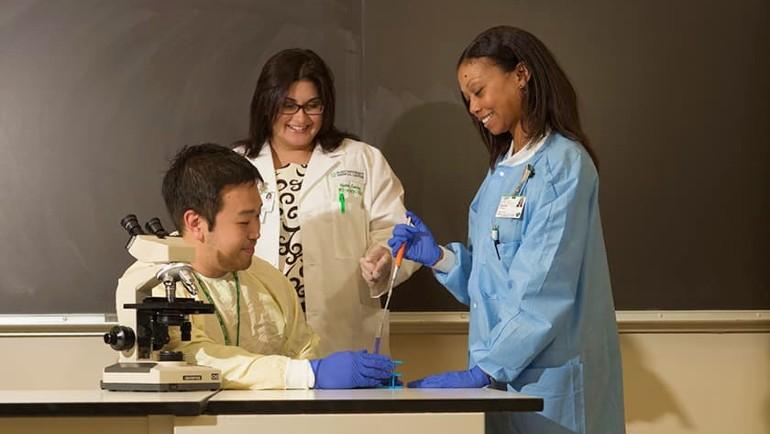Are you searching for a challenging career direction? Perhaps it’s time to get back in the lab and do some thinking that can change your life and the lives of others.
Medical laboratory scientists play a vital role in patient care while making use of leading-edge technology. They don’t work under a microscope — they work with them, operating mostly in the background as they use their innate curiosity to help clinicians diagnose, treat and monitor diseases.
Interested? Let’s take a closer look.
What is the field of medical laboratory science?
Diagnostic testing is the backbone of patient care. In fact, 70 percent of all physician decisions are based on laboratory test results provided by medical laboratory scientists (MLS), who are also known as medical technologists and clinical laboratory scientists. With a focus on the analysis of biological specimens as a whole, they’re paramount to the process of sample testing and delivering patient results to physicians.
For example, you may work with a hematologist — a physician who treats blood disorders — to analyze red and white blood cells to determine if they’re normal or indicate a disease. Not only is this position vital for monitoring the progressive nature of many diseases, but it helps physicians develop effective therapy treatments. Medicine is a collaborative environment, and medical laboratory scientists are essential to many aspects of microbiology, immunology, chemistry, toxicology, and more.
“This is for the person who really likes to work with their hands, ask questions and problem-solve,” says Maribeth Flaws, PhD, chairperson of the Department of Medical Laboratory Science at Rush University.
Why obtain a master’s degree in medical laboratory science
A master’s in Medical Laboratory Science helps medical laboratory scientists become leaders in a field that is highly valued and continues to grow as the instruments and technologies used to detect disease and monitor treatment become more sophisticated. Due to constantly evolving diagnostic technology, more and more medical laboratory scientists are spending less time in the lab and more time interacting with clinicians to help them figure out which tests to order and what the results mean for their patients.
With a medical laboratory science degree, you’ll have the opportunity to establish a career in this dynamic healthcare field. You’ll receive education and training beyond a bachelor’s degree that will include coursework to help position you as a future clinical laboratory leader. You will also be well-positioned to move into management roles faster.
In addition, obtaining a medical laboratory science degree can provide an excellent knowledge base that can be a stepping stone to degrees in other healthcare fields — from nursing and research to physicians and physician assistants.
Why choose a career in medical laboratory science?
Strong job demand
The Bureau of Labor Statistics projects a 13 percent job growth for medical laboratory professionals from 2016 to 2026, which is considerably faster than other careers. There is a critical shortage in the field due to the rising importance of technology in making health care decisions. Graduates often receive multiple job offers and are usually able to be picky about where in the country they want to work, their work setting, and which shifts they take.
Rising salaries
According to ZipRecruiter, the average salary for a medical laboratory scientist in the U.S. is roughly $76,453 based on experience, but pay tends to be higher for medical laboratory scientists with a master’s degree. Salaries depend on different factors, such as where in the country you work and which shifts you take. In California, where the cost of living is higher, you may start off earning $100,000. The highest 10 percent of earners make more than $80,000.
A variety of career options
Medical laboratory scientists don’t just work in hospitals or diagnostic laboratories. You may find yourself teaching, working in a research facility, or in a veterinary clinic or zoo. There is a demand for medical laboratory scientists in fertility clinics and pharmaceutical companies. Or you may find your niche in law enforcement working in a forensic crime lab.
Potential career areas with a medical laboratory science degree
There is certainly no lack of variety in the field. With a medical laboratory science degree, you’ll have the ability to work in different areas of medicine on any given day.
Clinical Chemistry
In this career path, you’ll search for markers of diseases, such as diabetes, cardiac disease, and cancer. As a clinical laboratory technician, you’ll primarily be working with blood and tissue samples by running numerous analytical experiments. Many of the measurements you’ll be taking will include hormone levels, iron, proteins, electrolytes, and a long list of other chemicals.
For either a physician or assistant position, the position generally requires an associates degree or vocational training. If you decide to pursue this career path in MLS, you can expect a salary ranging anywhere from $50,000 to $60,000.
Clinical Microbiology
Find out what is causing a patient’s infection. Do they have a virus, bacteria, a parasite, yeast, or mold? If it is a bacteria, you’ll figure out what species it is to help clinicians identify which medications will be most effective. Moreover, you’ll spend ample time analyzing results from experiments on microorganisms, which help physicians deliver an accurate diagnosis to patients. For a career in clinical microbiology, you’ll more than likely need an associate’s degree in clinical or medical laboratory science.
Training will include courses such as microbiology, general education, scientific lectures, and hands-on clinical training. Depending on the exact path you take with this career, your salary could average around $57,000 based on location and experience.
Hematology
With this route, you’ll analyze blood to help diagnose and treat diseases such as leukemia or lymphoma. In addition, you’ll produce reports based on your findings, which physicians will use to help diagnose any ailments their patients may have. Regarding training, a biology, chemistry, or medical laboratory technology associate’s degree is generally required.
This provides training and education on the basics of biology, chemistry, and a variety of clinical techniques. You may also encounter direct courses on hematology and phlebotomy. The average salary you can expect for this position resides around $56,000 per year.
Immunohematology
Identify the antigens and antibodies related to red blood cells in patients and donor blood to determine a compatible match for a patient who needs a blood transfusion. The skill sets needed will require quality control, general safety, and basic laboratory techniques. Some of the procedures you’ll encounter include component preparation and use, donor selection, and techniques to identify antibody and antigen reactions.
Some of the training and education that’s required include areas such as preparation of components, pretransfusion testing procedures, autoimmune hemolytic anemias, obstetrical transfusion practice, and more. Currently, the national average for this particular position is around $64,000 per year.
Toxicology
Monitor medication levels in patients to ensure they have an appropriate amount in their system. More specifically, this field focuses on the harmful effects of drugs and chemicals. You can expect to perform thorough scientific research on chemicals that can be hazardous to the human body. Additionally, your expertise will be utilized to create the standards needed to help educate the public about consequences and potential side effects.
A PhD in either toxicology or chemistry is required, and training will include biotechnological techniques, insight into toxins and drugs on a molecular scale, and how these aspects can affect the human body. Other coursework that can be expected is analytic, mechanistic, and regulatory and environmental toxicology. With this career path, it’s known that the average salary sits around $82,000 and this can vary based on location and expertise.
“You can be a generalist and do everything, or you can be a specialist and just do what you like,” Flaws says. “There’s a lot of flexibility working in the clinical laboratory.”
Follow this link to learn about Rush’s Master of Science in Medical Laboratory Science program.






